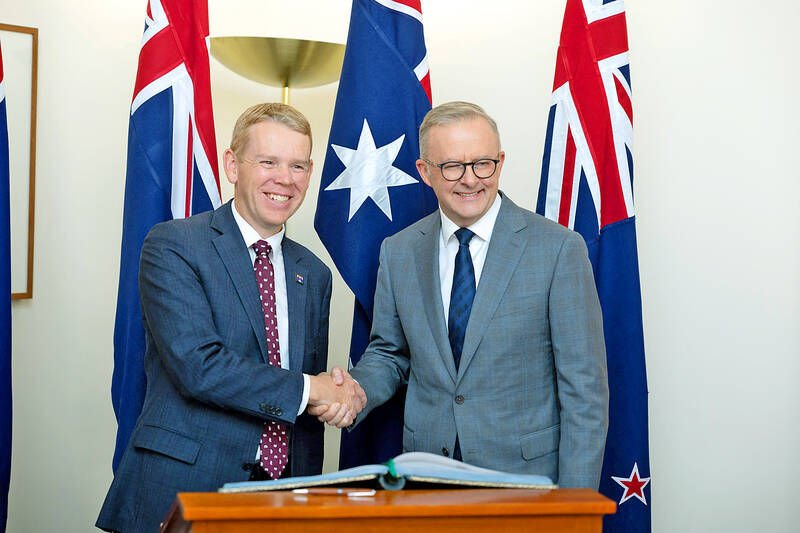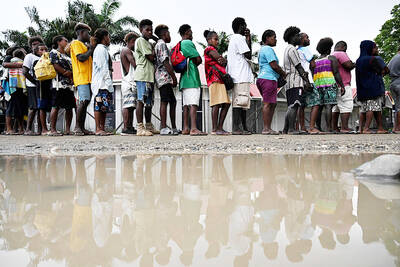The Australian and New Zealand prime ministers met yesterday to talk about China’s importance to their national economies, resolving to voice their disagreements with their most important trading partner that is becoming more assertive in their region.
New Zealand Prime Minister Chris Hipkins made Australia the destination of his first overseas trip as his government’s leader since his predecessor Jacinda Ardern announced her surprise resignation last month.
The visit to Australia’s Parliament House comes two weeks after Hipkins assumed office on Jan. 25. He used a joint news conference with Australian Prime Minister Anthony Albanese to give an assurance that he was keeping New Zealand’s foreign policy direction.

Photo: AFP
“Our foreign policy position hasn’t changed just because there’s a change of prime minister,” Hipkins said. “The government foreign policy is the same as it was under prime minister Ardern.”
A reporter put to Hipkins that Ardern had been reluctant to stand up against “bad behavior by China” and asked if he was concerned about Chinese coercion in the South Pacific.
“China is an incredibly important partner for New Zealand, a very important trading partner, and a partner in other areas as well,” Hipkins said. “That doesn’t mean there aren’t going to be areas where we disagree from time to time, and we’ll continue to voice our disagreements with China when that happens and we’ll always continue to strive to strengthen that ongoing relationship.”
Albanese said Australia’s national interests include restoring good trade and economic relations with China.
“Our position on China is clear, that we’ll cooperate where we can, we’ll disagree where we must and we’ll engage in our national interests,” Albanese said.
Albanese’s administration is rebuilding Australia’s trading relationship with China after bilateral ties plumbed new depths under the previous conservative government’s nine years in power.
Chinese and Australian trade ministers on Monday had their first meeting in more than three years in a major step toward normalizing relations.
Official and unofficial trade barriers on Australian products including coal, beef, seafood, barley and wood cost the nation’s exporters A$20 billion (US$13.9 billion) a year.
The barriers are largely seen as Beijing punishing the previous government for disagreements including Australian demands for an independent inquiry into the origins of and responses to the COVID-19 pandemic.
Some say New Zealand has avoided such trade retaliation by avoiding criticizing China.
New Zealand found itself on the defensive with its Five Eyes security allies — the US, Canada, the UK and Australia — in 2021 by resisting speaking out in unison with them against China on certain human rights issues.
Asked whether New Zealand was interested in being part of the AUKUS security partnership, currently between Australia, the US and the UK, Hipkins said his government’s position had not changed.
“Australia, the US, the UK are incredibly important security partners for New Zealand, but our nuclear-free policy hasn’t changed,” he said.
Additional reporting by Bloomberg

SEEKING CHANGE: A hospital worker said she did not vote in previous elections, but ‘now I can see that maybe my vote can change the system and the country’ Voting closed yesterday across the Solomon Islands in the south Pacific nation’s first general election since the government switched diplomatic allegiance from Taiwan to Beijing and struck a secret security pact that has raised fears of the Chinese navy gaining a foothold in the region. The Solomon Islands’ closer relationship with China and a troubled domestic economy weighed on voters’ minds as they cast their ballots. As many as 420,000 registered voters had their say across 50 national seats. For the first time, the national vote also coincided with elections for eight of the 10 local governments. Esther Maeluma cast her vote in the
Nearly half of China’s major cities are suffering “moderate to severe” levels of subsidence, putting millions of people at risk of flooding, especially as sea levels rise, according to a study of nationwide satellite data released yesterday. The authors of the paper, published by the journal Science, found that 45 percent of China’s urban land was sinking faster than 3mm per year, with 16 percent at more than 10mm per year, driven not only by declining water tables, but also the sheer weight of the built environment. With China’s urban population already in excess of 900 million people, “even a small portion

UNSETTLING IMAGES: The scene took place in front of TV crews covering the Trump trial, with a CNN anchor calling it an ‘emotional and unbelievably disturbing moment’ A man who doused himself in an accelerant and set himself on fire outside the courthouse where former US president Donald Trump is on trial has died, police said yesterday. The New York City Police Department (NYPD) said the man was declared dead by staff at an area hospital. The man was in Collect Pond Park at about 1:30pm on Friday when he took out pamphlets espousing conspiracy theories, tossed them around, then doused himself in an accelerant and set himself on fire, officials and witnesses said. A large number of police officers were nearby when it happened. Some officers and bystanders rushed

HYPOCRISY? The Chinese Ministry of Foreign Affairs yesterday asked whether Biden was talking about China or the US when he used the word ‘xenophobic’ US President Joe Biden on Wednesday called for a hike in steel tariffs on China, accusing Beijing of cheating as he spoke at a campaign event in Pennsylvania. Biden accused China of xenophobia, too, in a speech to union members in Pittsburgh. “They’re not competing, they’re cheating. They’re cheating and we’ve seen the damage here in America,” Biden said. Chinese steel companies “don’t need to worry about making a profit because the Chinese government is subsidizing them so heavily,” he said. Biden said he had called for the US Trade Representative to triple the tariff rates for Chinese steel and aluminum if Beijing was